Iran's Ayatollah Khamenei throws wrench in emerging Iran nuclear deal
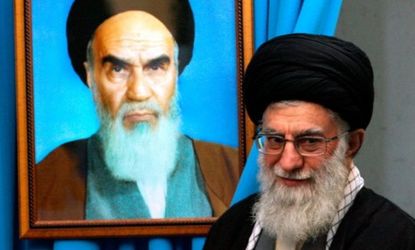

Seven-nation talks on a deal to curb Iran's nuclear program are running up against a June 30 deadline, and remarks late Tuesday from Iran's supreme leader won't help. In a televised address, Ayatollah Ali Khamenei said that Iran won't allow a long-term freeze on sensitive nuclear research, won't let international inspectors examine military sites, and won't sign a deal until international sanctions are lifted.
"Freezing Iran's research and development for a long time, like 10 or 12 years, is not acceptable," Khamenei said, seemingly negating a key Western demand that Iran freeze nuclear activity for at least a decade. "Inspection of our military sites is out of the question and is one of our red lines," he added, bolstered by a bill that passed in Iran's parliament on Tuesday that bans International Atomic Energy Agency inspectors from accessing military sites and nuclear scientists.
There is a bit of hedging in Khamenei's public declarations, and some experts say the speech was meant to either mollify Iran's hardliners or strengthen the Iranian negotiators' bargaining position. "My best judgment is that this is about leverage," Cliff Kupchan, the chairman of Eurasia Group, tells The New York Times. "This is the last time to get the best possible deal. I think what he's shooting for is the most sanctions relief he can get as soon as he can get it, and the least intrusive inspection regime going forward."
Subscribe to The Week
Escape your echo chamber. Get the facts behind the news, plus analysis from multiple perspectives.

Sign up for The Week's Free Newsletters
From our morning news briefing to a weekly Good News Newsletter, get the best of The Week delivered directly to your inbox.
From our morning news briefing to a weekly Good News Newsletter, get the best of The Week delivered directly to your inbox.
There's a good chance the Iran talks will continue past the June 30 deadline.
Sign up for Today's Best Articles in your inbox
A free daily email with the biggest news stories of the day – and the best features from TheWeek.com
Peter has worked as a news and culture writer and editor at The Week since the site's launch in 2008. He covers politics, world affairs, religion and cultural currents. His journalism career began as a copy editor at a financial newswire and has included editorial positions at The New York Times Magazine, Facts on File, and Oregon State University.
-
 'The disconnect between actual health care and the insurance model is widening'
'The disconnect between actual health care and the insurance model is widening'Instant Opinion Opinion, comment and editorials of the day
By Anya Jaremko-Greenwold, The Week US Published
-
 Cautious optimism surrounds plans for the world's first nuclear fusion power plant
Cautious optimism surrounds plans for the world's first nuclear fusion power plantTalking Point Some in the industry feel that the plant will face many challenges
By Justin Klawans, The Week US Published
-
 Explore new worlds this winter at these 6 enlightening museum exhibitions
Explore new worlds this winter at these 6 enlightening museum exhibitionsThe Week Recommends Discover the estrados of Spain and the connection between art and chess in various African countries
By Catherine Garcia, The Week US Published
-
 British warship repels 'largest Houthi attack to date' in the Red Sea
British warship repels 'largest Houthi attack to date' in the Red SeaSpeed read Western allies warn of military response to Iranian-backed Yemeni rebels if attacks on ships continue
By Richard Windsor, The Week UK Published
-
 Houthi rebels claim Red Sea ship attacks
Houthi rebels claim Red Sea ship attacksspeed read Iran-backed Yemeni group vows to escalate aggression towards Israel-linked vessels in revenge for Gaza war
By Harriet Marsden, The Week UK Published
-
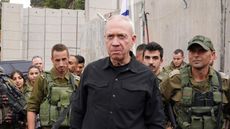 Israel plans next phase of Gaza war as first hostages released
Israel plans next phase of Gaza war as first hostages releasedSpeed read After four-day ceasefire 'we will not stop' until destruction of Hamas, says Israel
By Harriet Marsden, The Week UK Published
-
 Mob storms Russian airport 'looking for Jews'
Mob storms Russian airport 'looking for Jews'Speed Read Plane from Israel surrounded by rioters chanting antisemitic slogans after landing in Russia's Dagestan region
By The Week UK Published
-
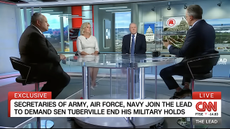 Tuberville's military promotions block is upending lives, combat readiness, 3 military branch chiefs say
Tuberville's military promotions block is upending lives, combat readiness, 3 military branch chiefs saySpeed Read
By Peter Weber Published
-
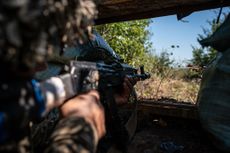 Ukraine's counteroffensive is making incremental gains. Does it matter in the broader war?
Ukraine's counteroffensive is making incremental gains. Does it matter in the broader war?Speed Read
By Peter Weber Published
-
 US commissions first-ever Navy ship in a foreign port
US commissions first-ever Navy ship in a foreign portSpeed Read
By Justin Klawans Published
-
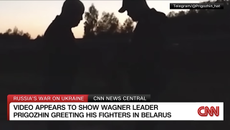 British spy chief, Wagner video suggest Prigozhin is alive and freely 'floating around'
British spy chief, Wagner video suggest Prigozhin is alive and freely 'floating around'Speed Read
By Peter Weber Published